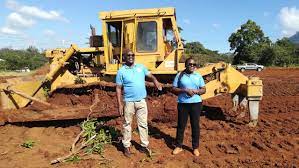The construction of a K2.1 billion SRWB water bottling plant at Old Naisi has gotten underway. Southern Region Water Board (SRWB) inaugurated the project which once completed, will be producing 9,000 cubic litres per hour.
According to Emmanuel Chirwa, the Infrastructure Development Manager for SRWB, the board has already obtained funds for the implementation of the project.
Mr Chirwa, made the revelation while Speaking in Zomba after scrutinizing the construction site. Furthermore, the Infrastructure Development Manager revealed that the SRWB water bottling plant at Old Naisi will be ready by September.
The facility will generate revenue for the board while addressing water scarcity in Malawi, where as many as 4 million people do not have access to clean water. The water will be packaged in 500 millilitres, 1 litre, 5 litres and 20 litres according to Chirwa.
Residents welcome the SRWB water bottling plant at Old Naisi
Residents of Chinamwali Township applauded SRWB for diversifying its revenue sources. The project is expected to boost the local community by providing additional employment opportunities.
Malawi is a new sovereign and densely populated country. Furthermore, the Malawi water crisis is a complex problem linked to natural disasters and the country’s general topography.
Therefore, SRWB is targeting to use of the water bottling plant to rescue humanitarian crises in the country. The water bottling plant will not only provide safe water for drinking but also provide economic stability.
Also Read: SRWB to borrow US $35.7m from EIB for water projects in Southern Malawi
Additionally, the lack of clean water contributes to a range of health crises and causes thousands of mortalities each year. The board is targeting to step up and boost the health situation of Malawi.
Due to a shortage of enough water, Malawi faces adequate water crops and food shortages. This creates yet another set of challenges. When water is scarce, the human body depends on food as a source of hydration. Therefore, the poor crop yields make that solution impossible in Malawi.

